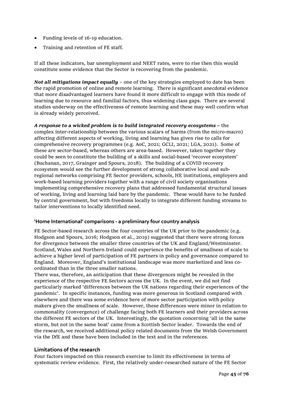
Page 45 of 76
• Funding levels of 16-19 education.
• Training and retention of FE staff.
If all these indicators, bar unemployment and NEET rates, were to rise then this would
constitute some evidence that the Sector is recovering from the pandemic.
Not all mitigations impact equally - one of the key strategies employed to date has been
the rapid promotion of online and remote learning. There is significant anecdotal evidence
that more disadvantaged learners have found it more difficult to engage with this mode of
learning due to resource and familial factors, thus widening class gaps. There are several
studies underway on the effectiveness of remote learning and these may well confirm what
is already widely perceived.
A response to a wicked problem is to build integrated recovery ecosystems - the
complex inter-relationship between the various scalars of harms (from the micro-macro)
affecting different aspects of working, living and learning has given rise to calls for
comprehensive recovery programmes (e.g. AoC, 2021; GCLI, 2021; LGA, 2021). Some of
these are sector-based, whereas others are area-based. However, taken together they
could be seen to constitute the building of a skills and social-based 'recover ecosystem'
(Buchanan, 2017, Grainger and Spours, 2018). The building of a COVID recovery
ecosystem would see the further development of strong collaborative local and subregional
networks comprising FE Sector providers, schools, HE institutions, employers and
work-based learning providers together with a range of civil society organisations
implementing comprehensive recovery plans that addressed fundamental structural issues
of working, living and learning laid bare by the pandemic. These would have to be funded
by central government, but with freedoms locally to integrate different funding streams to
tailor interventions to locally identified need.
'Home International' comparisons - a preliminary four country analysis
FE Sector-based research across the four countries of the UK prior to the pandemic (e.g.
Hodgson and Spours, 2016; Hodgson et al., 2019) suggested that there were strong forces
for divergence between the smaller three countries of the UK and England/Westminster.
Scotland, Wales and Northern Ireland could experience the benefits of smallness of scale to
achieve a higher level of participation of FE partners in policy and governance compared to
England. Moreover, England's institutional landscape was more marketized and less coordinated
than in the three smaller nations.
There was, therefore, an anticipation that these divergences might be revealed in the
experience of the respective FE Sectors across the UK. In the event, we did not find
particularly marked 'differences between the UK nations regarding their experiences of the
pandemic'. In specific instances, funding was more generous in Scotland compared with
elsewhere and there was some evidence here of more sector participation with policy
makers given the smallness of scale. However, these differences were minor in relation to
commonality (convergence) of challenge facing both FE learners and their providers across
the different FE sectors of the UK. Interestingly, the quotation concerning 'all in the same
storm, but not in the same boat' came from a Scottish Sector leader. Towards the end of
the research, we received additional policy related documents from the Welsh Government
via the DfE and these have been included in the text and in the references.
Limitations of the research
Four factors impacted on this research exercise to limit its effectiveness in terms of
systematic review evidence. First, the relatively under-researched nature of the FE Sector